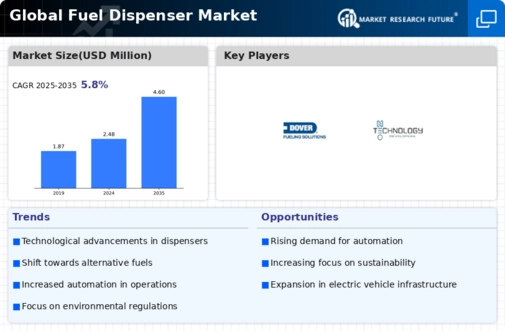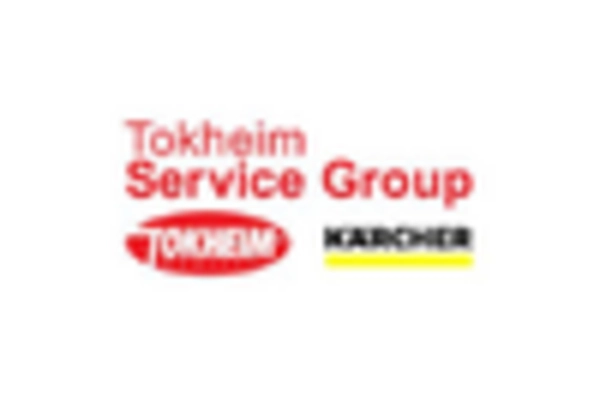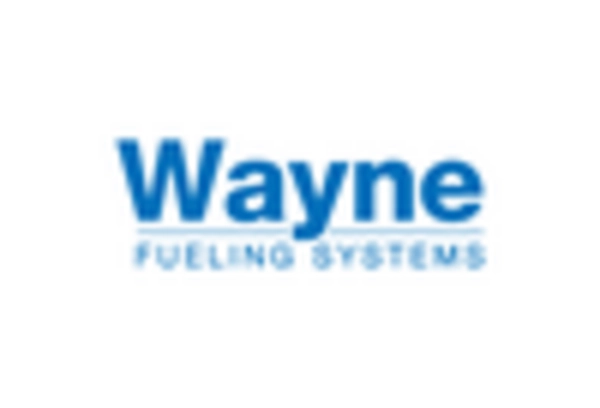-
Executive Summary
-
Market Introduction
-
Definition 20
-
Scope Of The Study 20
-
List Of Assumptions 21
-
Market Structure 21
-
Macro Factor Indicators Analysis 22
-
Research Methodology
-
Research Process 24
-
Primary Research 25
-
Secondary Research 26
-
Market Size Estimation 26
-
Forecast Model 27
-
Market Dynamics
-
Introduction 29
-
Drivers 29
- Rapid Adoption Of Natural Gas Vehicles 29
- Increasing Consumption Of Petroleum Products In Emerging Economies 30
- Drivers Impact Analysis 31
-
Restraints 31
- Reducing Number Of Fuel Stations 31
- Rising Sales Of Electric Vehicles 32
- Restraints Impact Analysis 33
-
Opportunity 34
- Updated Fuel Dispensers With EMV 34
-
Maket Factor Analysis
-
Supply Chain Analysis 36
- Component Supply 36
- Manufacturing And Assembly 36
- Supply And Distribution 36
- End Use 36
-
Porter’s Five Forces Model 37
- Threat Of New Entrants 37
- Bargaining Power Of Suppliers 37
- Bargaining Power Of Buyers 38
- Threat Of Substitutes 38
- Rivalry 38
-
Manufacturing Process 39
- Raw Material 39
- Hydraulic Unit Manufacturing 39
- Electronic Unit Manufacturing 39
- Housing 39
- Assembly 39
-
Regulatory Landscape 40
-
Patent Analysis 42
-
Global Fuel Dispenser Market, By Product
-
Overview 44
- General Fuel Dispenser 44
- Self-Service Fuel Dispenser 44
-
Global Fuel Dispenser Market, By Type
-
Overview 47
- Submersible 47
- Suction 47
-
Global Fuel Dispenser Market, By Application
-
Overview 49
- Petrol 49
- Diesel 49
- Biofuel 49
- Others 49
-
Global Fuel Dispenser Market, By Region
-
Overview 52
-
North America 54
- US 59
- Canada 63
-
Europe 67
- Germany 73
- Italy 77
- UK 81
- France 85
- Rest Of Europe 89
-
Asia-Pacific 93
- China 99
- India 103
- Japan 107
- Rest Of Asia-Pacific 111
-
Rest Of The World 115
- Middle East & Africa 121
- Latin America 126
-
Competitive Landscape
-
Competitive Scenario 130
-
Global Fuel Dispenser Market: Key Mergers & Acquisitions 130
-
Global Fuel Dispenser Market: Key Partnerships And Collaborations 131
-
Global Fuel Dispenser Market: Key Product Developments 131
-
Global Fuel Dispenser Market: Expansions 131
-
Competitor Benchmarking 132
-
Global Fuel Dispenser Market: Distributor List 133
-
Company Profiles
-
Gilbarco Inc. 135
- Products/Services Offered 135
- Financial Overview 136
- SWOT Analysis 136
- Strategies 136
-
Dover Fueling Solutions 137
- Products/Services Offered 138
- Financial Overview 138
- SWOT Analysis 139
- Strategies 139
-
Tatsuno Corporation 140
- Products/Services Offered 140
- Financial Overview 140
- SWOT Analysis 141
- Strategies 141
-
Bennett Pump Company 142
- Products/Services Offered 142
- Financial Overview 143
- SWOT Analysis 143
- Strategies 143
-
Scheidt & Bachmann Tubs D.O.O. 144
- Products/Services Offered 145
- Financial Overview 145
- SWOT Analysis 145
- Strategies 145
-
NEOTEC 146
- Products/Services Offered 147
- Financial Overview 147
-
LanFeng Co., Ltd 148
- Products/Services Offered 149
- Financial Overview 149
-
Piusi SpA 150
- Products/Services Offered 150
- Financial Overview 150
-
Beijing Sanki Petroleum Technology Co., Ltd 151
- Products/Services Offered 151
- Financial Overview 152
-
Censtar Science & Technology Co., Ltd 153
- Products/Services Offered 154
- Financial Overview 154
-
Tominaga Mfg Co. 155
- Products/Services Offered 156
- Financial Overview 156
-
Korea EnE Co., Ltd 157
- Products/Services Offered 158
- Financial Overview 158
-
Zhejiang Datian Machine Co., Ltd 159
- Products/Services Offered 160
- Financial Overview 161
-
List Of Tables
-
MARKET SYNOPSIS 18
-
LIST OF ASSUMPTIONS 21
-
MACRO INDICATORS INFLUENCING THE GLOBAL FUEL DISPENSER MARKET FOR TOP 5 COUNTRIES 22
-
GLOBAL FUEL DISPENSER MARKET: REGULATORY LANDSCAPE 40
-
MAJOR GRANTED PATENTS FOR FUEL DISPENSERS (28 NOVEMBER 2020–28 NOVEMBER 2020) 42
-
GLOBAL FUEL DISPENSER BY PRODUCTS, BY VOLUME, 2022- 2030 (THOUSAND UNITS) 45
-
GLOBAL FUEL DISPENSER BY PRODUCTS, BY VOLUME, 2022- 2030 (THOUSAND UNITS) 45
-
GLOBAL FUEL DISPENSER MARKET, BY PRODUCT, BY VALUE, 2022- 2030 (USD MILLION) 46
-
GLOBAL FUEL DISPENSER MARKET, BY PRODUCT, BY VALUE, 2022- 2030 (USD MILLION) 46
-
GLOBAL FUEL DISPENSER MARKET, BY TYPE, BY VOLUME, 2022- 2030 (THOUSAND UNITS) 48
-
GLOBAL FUEL DISPENSER BY PRODUCTS, BY VOLUME, 2022- 2030 (THOUSAND UNITS) 48
-
GLOBAL FUEL DISPENSER MARKET, BY PRODUCT, BY VALUE, 2022- 2030 (USD MILLION) 48
-
GLOBAL FUEL DISPENSER MARKET, BY PRODUCT, BY VALUE, 2022- 2030 (USD MILLION) 48
-
GLOBAL FUEL DISPENSER MARKET, BY APPLICATION, BY VOLUME, 2022- 2030 (THOUSAND UNITS) 50
-
GLOBAL FUEL DISPENSER BY APPLICATION, BY VOLUME, 2022- 2030 (THOUSAND UNITS) 50
-
GLOBAL FUEL DISPENSER MARKET, BY APPLICATION, BY VALUE, 2022- 2030 (USD MILLION) 51
-
GLOBAL FUEL DISPENSER MARKET, BY APPLICATION, BY VALUE, 2022- 2030 (USD MILLION) 51
-
GLOBAL FUEL DISPENSER MARKET, BY REGION, BY VOLUME, 2022- 2030 (THOUSAND UNITS) 52
-
GLOBAL FUEL DISPENSER BY PRODUCTS, BY VOLUME, 2022- 2030 (THOUSAND UNITS) 52
-
GLOBAL FUEL DISPENSER MARKET, BY REGION, BY VALUE, 2022- 2030 (USD MILLION) 53
-
GLOBAL FUEL DISPENSER MARKET, BY PRODUCT, BY VALUE, 2022- 2030 (USD MILLION) 53
-
NORTH AMERICA: FUEL DISPENSER MARKET, BY COUNTRY, BY VOLUME, 2022- 2030 (THOUSAND UNITS) 54
-
NORTH AMERICA: FUEL DISPENSER MARKET, BY COUNTRY, BY VOLUME, 2022- 2030 (THOUSAND UNITS) 54
-
NORTH AMERICA: FUEL DISPENSER MARKET, BY COUNTRY, BY VALUE, 2022- 2030 (USD MILLION) 55
-
NORTH AMERICA: FUEL DISPENSER MARKET, BY COUNTRY, BY VALUE, 2022- 2030 (USD MILLION) 55
-
NORTH AMERICA: FUEL DISPENSER MARKET, BY PRODUCT, BY VOLUME, 2022- 2030 (THOUSAND UNITS) 55
-
NORTH AMERICA: FUEL DISPENSER MARKET, BY PRODUCT, BY VOLUME, 2022- 2030 (THOUSAND UNITS) 55
-
NORTH AMERICA: FUEL DISPENSER MARKET, BY PRODUCT, BY VALUE, 2022- 2030 (USD MILLION) 56
-
NORTH AMERICA: FUEL DISPENSER MARKET, BY PRODUCT, BY VALUE, 2022- 2030 (USD MILLION) 56
-
NORTH AMERICA: FUEL DISPENSER MARKET, BY TYPE, BY VOLUME, 2022- 2030 (THOUSAND UNITS) 56
-
NORTH AMERICA: FUEL DISPENSER MARKET, BY TYPE, BY VOLUME, 2022- 2030 (THOUSAND UNITS) 56
-
NORTH AMERICA: FUEL DISPENSER MARKET, BY TYPE, BY VALUE, 2022- 2030 (USD MILLION) 57
-
NORTH AMERICA: FUEL DISPENSER MARKET, BY TYPE, BY VALUE, 2022- 2030 (USD MILLION) 57
-
NORTH AMERICA: FUEL DISPENSER MARKET, BY APPLICATION, BY VOLUME, 2022- 2030 (THOUSAND UNITS) 57
-
NORTH AMERICA: FUEL DISPENSER MARKET, BY APPLICATION, BY VOLUME, 2022- 2030 (THOUSAND UNITS) 58
-
NORTH AMERICA: FUEL DISPENSER MARKET, BY APPLICATION, BY VALUE, 2022- 2030 (USD MILLION) 58
-
NORTH AMERICA: FUEL DISPENSER MARKET, BY APPLICATION, BY VALUE, 2022- 2030 (USD MILLION) 58
-
US: FUEL DISPENSER MARKET, BY PRODUCT, BY VOLUME, 2022- 2030 (THOUSAND UNITS) 59
-
US: FUEL DISPENSER MARKET, BY PRODUCT, BY VOLUME, 2022- 2030 (THOUSAND UNITS) 59
-
US: FUEL DISPENSER MARKET, BY PRODUCT, BY VALUE, 2022- 2030 (USD MILLION) 59
-
US: FUEL DISPENSER MARKET, BY PRODUCT, BY VALUE, 2022- 2030 (USD MILLION) 60
-
US: FUEL DISPENSER MARKET, BY TYPE, BY VOLUME, 2022- 2030 (THOUSAND UNITS) 60
-
US: FUEL DISPENSER MARKET, BY TYPE, BY VOLUME, 2022- 2030 (THOUSAND UNITS) 60
-
US: FUEL DISPENSER MARKET, BY TYPE, BY VALUE, 2022- 2030 (USD MILLION) 61
-
US: FUEL DISPENSER MARKET, BY COUNTRY, BY VALUE 2022- 2030 (USD MILLION) 61
-
US: FUEL DISPENSER MARKET, BY APPLICATION, BY VOLUME, 2022- 2030 (THOUSAND UNITS) 61
-
US: FUEL DISPENSER MARKET, BY APPLICATION, BY VOLUME, 2022- 2030 (THOUSAND UNITS) 62
-
US: FUEL DISPENSER MARKET, BY APPLICATION, BY VALUE, 2022- 2030 (USD MILLION) 62
-
US: FUEL DISPENSER MARKET, BY APPLICATION, BY VALUE, 2022- 2030 (USD MILLION) 62
-
CANADA: FUEL DISPENSER MARKET, BY PRODUCT, BY VOLUME, 2022- 2030 (THOUSAND UNITS) 63
-
CANADA: FUEL DISPENSER MARKET, BY PRODUCT, BY VOLUME, 2022- 2030 (THOUSAND UNITS) 63
-
CANADA: FUEL DISPENSER MARKET, BY PRODUCT, BY VALUE, 2022- 2030 (USD MILLION) 63
-
CANADA: FUEL DISPENSER MARKET, BY PRODUCT, BY VALUE, 2022- 2030 (USD MILLION) 64
-
CANADA: FUEL DISPENSER MARKET, BY TYPE, BY VOLUME, 2022- 2030 (THOUSAND UNITS) 64
-
CANADA: FUEL DISPENSER MARKET, BY TYPE, BY VOLUME, 2022- 2030 (THOUSAND UNITS) 64
-
CANADA: FUEL DISPENSER MARKET, BY TYPE, BY VALUE, 2022- 2030 (USD MILLION) 65
-
CANADA: FUEL DISPENSER MARKET, BY COUNTRY, BY VALUE 2022- 2030 (USD MILLION) 65
-
CANADA: FUEL DISPENSER MARKET, BY APPLICATION, BY VOLUME, 2022- 2030 (THOUSAND UNITS) 65
-
CANADA: FUEL DISPENSER MARKET, BY APPLICATION, BY VOLUME, 2022- 2030 (THOUSAND UNITS) 66
-
General Fuel Dispenser
Self-Service Fuel Dispenser
Submersible
Suction
Petrol
Diesel
Biofuel
Others
North America Fuel Dispenser by ProductGeneral Fuel Dispenser
Self-Service Fuel Dispenser
North America Fuel Dispenser by TypeSubmersible
Suction
North America Fuel Dispenser by ApplicationPetrol
Diesel
Biofuel
Others
US Fuel Dispenser by ProductGeneral Fuel Dispenser
Self-Service Fuel Dispenser
US Fuel Dispenser by TypeSubmersible
Suction
US Fuel Dispenser by ApplicationPetrol
Diesel
Biofuel
Others
CANADA Fuel Dispenser by ProductGeneral Fuel Dispenser
Self-Service Fuel Dispenser
CANADA Fuel Dispenser by TypeSubmersible
Suction
CANADA Fuel Dispenser by ApplicationPetrol
Diesel
Biofuel
Others
Europe Fuel Dispenser by ProductGeneral Fuel Dispenser
Self-Service Fuel Dispenser
Europe Fuel Dispenser by TypeSubmersible
Suction
Europe Fuel Dispenser by ApplicationPetrol
Diesel
Biofuel
Others
Germany Outlook (USD Million, 2018-2030)
Germany Fuel Dispenser by ProductGeneral Fuel Dispenser
Self-Service Fuel Dispenser
Germany Fuel Dispenser by TypeSubmersible
Suction
Germany Fuel Dispenser by ApplicationPetrol
Diesel
Biofuel
Others
France Fuel Dispenser by ProductGeneral Fuel Dispenser
Self-Service Fuel Dispenser
France Fuel Dispenser by TypeSubmersible
Suction
France Fuel Dispenser by ApplicationPetrol
Diesel
Biofuel
Others
UK Fuel Dispenser by ProductGeneral Fuel Dispenser
Self-Service Fuel Dispenser
UK Fuel Dispenser by TypeSubmersible
Suction
UK Fuel Dispenser by ApplicationPetrol
Diesel
Biofuel
Others
ITALY Fuel Dispenser by ProductGeneral Fuel Dispenser
Self-Service Fuel Dispenser
ITALY Fuel Dispenser by TypeSubmersible
Suction
ITALY Fuel Dispenser by ApplicationPetrol
Diesel
Biofuel
Others
Spain Fuel Dispenser by ProductGeneral Fuel Dispenser
Self-Service Fuel Dispenser
Spain Fuel Dispenser by TypeSubmersible
Suction
Spain Fuel Dispenser by ApplicationPetrol
Diesel
Biofuel
Others
Rest Of Europe Fuel Dispenser by ProductGeneral Fuel Dispenser
Self-Service Fuel Dispenser
REST OF EUROPE Fuel Dispenser by TypeSubmersible
Suction
REST OF EUROPE Fuel Dispenser by ApplicationPetrol
Diesel
Biofuel
Others
Asia-Pacific Fuel Dispenser by ProductGeneral Fuel Dispenser
Self-Service Fuel Dispenser
Asia-Pacific Fuel Dispenser by TypeSubmersible
Suction
Asia-Pacific Fuel Dispenser by ApplicationPetrol
Diesel
Biofuel
Others
China Fuel Dispenser by ProductGeneral Fuel Dispenser
Self-Service Fuel Dispenser
China Fuel Dispenser by TypeSubmersible
Suction
China Fuel Dispenser by ApplicationPetrol
Diesel
Biofuel
Others
Japan Fuel Dispenser by ProductGeneral Fuel Dispenser
Self-Service Fuel Dispenser
Japan Fuel Dispenser by TypeSubmersible
Suction
Japan Fuel Dispenser by ApplicationPetrol
Diesel
Biofuel
Others
India Fuel Dispenser by ProductGeneral Fuel Dispenser
Self-Service Fuel Dispenser
India Fuel Dispenser by TypeSubmersible
Suction
India Fuel Dispenser by ApplicationPetrol
Diesel
Biofuel
Others
Australia Fuel Dispenser by ProductGeneral Fuel Dispenser
Self-Service Fuel Dispenser
Australia Fuel Dispenser by TypeSubmersible
Suction
Australia Fuel Dispenser by ApplicationPetrol
Diesel
Biofuel
Others
Rest of Asia-Pacific Fuel Dispenser by ProductGeneral Fuel Dispenser
Self-Service Fuel Dispenser
Rest of Asia-Pacific Fuel Dispenser by TypeSubmersible
Suction
Rest of Asia-Pacific Fuel Dispenser by ApplicationPetrol
Diesel
Biofuel
Others
Rest of the World Fuel Dispenser by ProductGeneral Fuel Dispenser
Self-Service Fuel Dispenser
Rest of the World Fuel Dispenser by TypeSubmersible
Suction
Rest of the World Fuel Dispenser by ApplicationPetrol
Diesel
Biofuel
Others
Middle East Fuel Dispenser by ProductGeneral Fuel Dispenser
Self-Service Fuel Dispenser
Middle East Fuel Dispenser by TypeSubmersible
Suction
Middle East Fuel Dispenser by ApplicationPetrol
Diesel
Biofuel
Others
Africa Fuel Dispenser by ProductGeneral Fuel Dispenser
Self-Service Fuel Dispenser
Africa Fuel Dispenser by TypeSubmersible
Suction
Africa Fuel Dispenser by ApplicationPetrol
Diesel
Biofuel
Others
Latin America Fuel Dispenser by ProductGeneral Fuel Dispenser
Self-Service Fuel Dispenser
Latin America Fuel Dispenser by TypeSubmersible
Suction
Latin America Fuel Dispenser by ApplicationPetrol
Diesel
Biofuel
Others










Leave a Comment